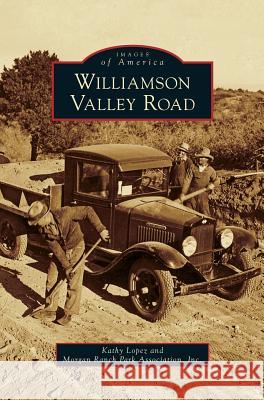Williamson Valley Road » książka
Williamson Valley Road
ISBN-13: 9781531652760 / Angielski / Twarda / 2011 / 130 str.
Centuries ago, Williamson Valley Road began as a game trail for
native inhabitants. In the 1400s, ancestors of the Yavapai and
Hualapai hunted along ancient footpaths. Later explorers widened
these paths for horses. The 1800s brought military wagons transporting
supplies between the Rawlins, Hualapai/Tollgate, and Fort Whipple
camps while traders and settlers followed in stagecoaches. The fertile
lands of Mint Valley, Williamson Valley, and Walnut Creek were
ideal for raising stock and produce. Farmers sailed from Europe and
up the Colorado River before traversing the Hardyville Toll Road.
Ranchers imported the fittest stock and exported the finest meat with
the expertise of Mexican ranch hands. Camp Wood timbermen met
the demand for lumber. Eastern store owners set up shop as railroaders
laid far-reaching plans but short-reaching rails. Residents in the early
1900s arrived at rodeos, camp meetings, concerts, and dances in their
Model Ts using this road. Present-day suburbanites, schoolchildren, and
contractors commute on Williamson Valley Road, which was designated
as a Scenic and Historic Route in 2010.
Centuries ago, Williamson Valley Road began as a game trail for
native inhabitants. In the 1400s, ancestors of the Yavapai and
Hualapai hunted along ancient footpaths. Later explorers widened
these paths for horses. The 1800s brought military wagons transporting
supplies between the Rawlins, Hualapai/Tollgate, and Fort Whipple
camps while traders and settlers followed in stagecoaches. The fertile
lands of Mint Valley, Williamson Valley, and Walnut Creek were
ideal for raising stock and produce. Farmers sailed from Europe and
up the Colorado River before traversing the Hardyville Toll Road.
Ranchers imported the fittest stock and exported the finest meat with
the expertise of Mexican ranch hands. Camp Wood timbermen met
the demand for lumber. Eastern store owners set up shop as railroaders
laid far-reaching plans but short-reaching rails. Residents in the early
1900s arrived at rodeos, camp meetings, concerts, and dances in their
Model Ts using this road. Present-day suburbanites, schoolchildren, and
contractors commute on Williamson Valley Road, which was designated
as a Scenic and Historic Route in 2010.











